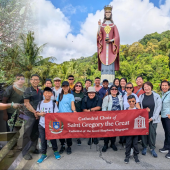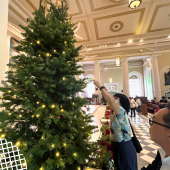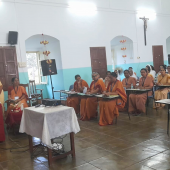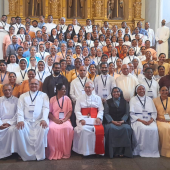In homily-like National Day address, Singapore Premier vows not to “let the aged live in isolation”
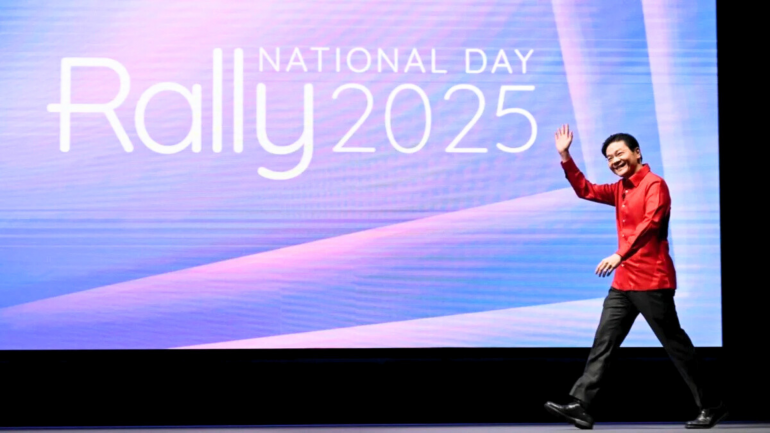
Singapore will continue to weather tough challenges such as international rivalry, the threat of technology replacing jobs and a rapidly ageing society, so long as Singaporeans remain united, said Prime Minister Lawrence Wong in his National Day Rally Speech.
In a nationally televised address on August 17, sounding at times like a homily delivered by a concerned parish priest, Singapore’s prime minister touched on issues he described as crucial not only to the nation’s economy but also to its social fabric: raising children in the era of technology, use of social media, value of education, importance of community building, caring for the aged, etc.
Noting that Singapore recently celebrated its landmark 60 years of independence, Mr Wong observed that this took place amid the backdrop of “a more troubled and turbulent world”.
“For decades, Singapore benefited from an American rules-based global order. It was not perfect, but it brought peace and stability to the world. Because the rules applied to all, so even a small city-state like ours could compete fairly,” he said. “But today, the US is pulling back. That has weakened the multilateral system.”
Now it is “every country for itself in a world where rivalry is intensifying and trust is in short supply”, he said. However, Singapore will not resign itself to this situation, he added. “We will take charge of our own destiny and we will shape the future we want through our own actions and our own choices.”
Speaking on how Singapore can continue to strengthen its economy amidst these and other developments such as Artificial Intelligence (AI), he acknowledged that AI can potentially replace many tasks, “even entire jobs”.
“I understand these concerns,” he said, adding that “we won't just rush headlong to adopt new technology”. Instead, the plan is to redesign jobs and empower every worker, such as upskilling them. “We may not be able to match other countries in size or scale, but we will stay ahead in ideas, in innovation, and in our collective will to move forward together,” said Mr Wong.
Turning to the topic of the nation’s youth, he said that his government will work towards ensuring a future that the young can look forward to “with confidence and hope”.
He acknowledged that many parents worry that their children are spending too much time on screens, whether scrolling on social media, surfing the internet or playing computer games. However, it is essential to strike a balance “between protecting our young from the potential harms and equipping and empowering them to fully exploit the benefits of technology”, he said.
Mr Wong noted that some countries have passed new laws to tighten access to the internet and social media for children. “We are studying their experiences closely to understand what truly works,” he said. Nevertheless, as children grow older, adults should “help them build digital resilience so they understand the risk, gain the skills and know how and learn to use technology safely and effectively.”
Referring to how some parents may want their children to learn faster and at a younger age amidst the advancement of technology, Mr Wong pointed out that learning has never been just about absorbing more content and knowledge. “It's about developing the ability to think, to solve problems, and to keep learning throughout life. And in this age of AI, what really matters are the human qualities that machines cannot replicate. Character, values, empathy, and a sense of purpose. These are far more important,” he stressed.
Turning to the topic of seniors, as Singapore is now a rapidly ageing society, he shared that the government is building more facilities in neighbourhoods to cater to the well-being of the elderly. Singapore does not intend to have “retirement villages” where seniors live “in separate isolated places,” he said. Instead, the plans are for seniors to be able to “age with dignity, purpose, and joy” wherever they live.
“And that's how we will grow old. Not in isolation, never alone, but always together as one Singapore family,” he said.
Mr Wong also emphasized the importance of keeping the Singapore spirit of fellowship and shared purpose thriving amidst current challenges. “That means strengthening our bonds with one another. It means feeling that we are all in this together and not just looking out for our own self-interest,” he said.
“To keep Singapore going, we must be a ‘we first’ society. Because if everyone only thinks about ‘me’ and puts ‘me’ ahead of ‘we’, then we are finished. Society will fray and things will fall apart.”
Mr Wong also stressed that “greatness” is not just about being able to achieve huge goals. “It's also in the aspirations and hopes of every Singaporean -- the student striving to do better, the parent working hard for the family, the volunteer and silent unsung heroes stepping forward to make a difference. Each of these speaks to the heart of who we are as Singaporeans.”
Radio Veritas Asia (RVA), a media platform of the Catholic Church, aims to share Christ. RVA started in 1969 as a continental Catholic radio station to serve Asian countries in their respective local language, thus earning the tag “the Voice of Asian Christianity.” Responding to the emerging context, RVA embraced media platforms to connect with the global Asian audience via its 21 language websites and various social media platforms.









